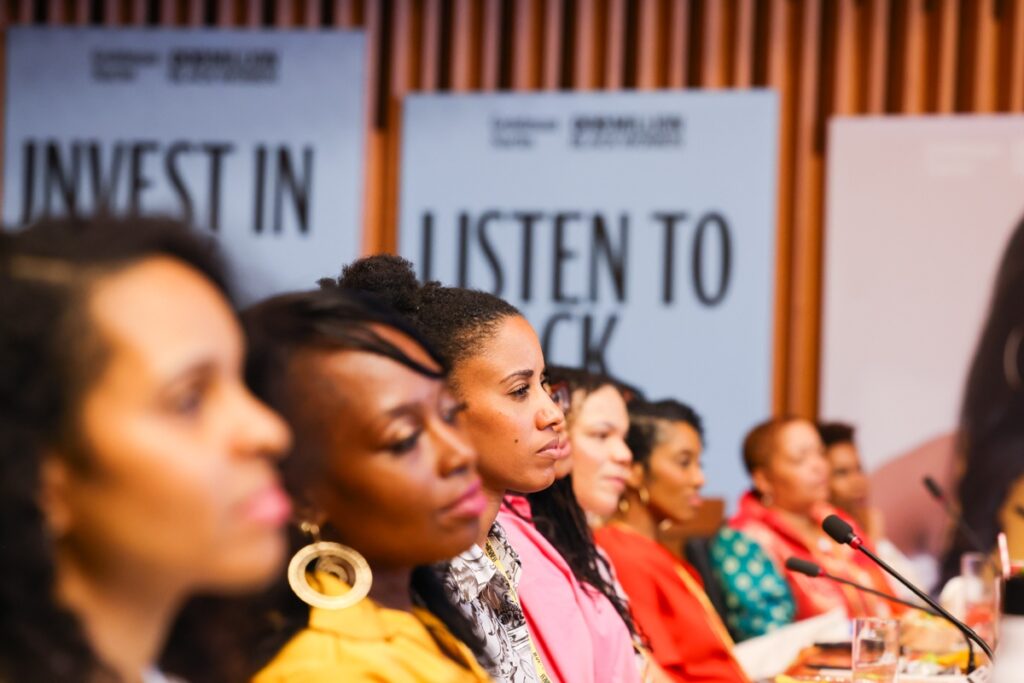In 2021, Goldman Sachs set a 10-year goal of improving the lives of 1 million Black women by 2030 by launching One Million Black Women, a commitment of $10 billion in investment capital and $100 million in philanthropic capital to help drive wealth creation for Black women across six pillars: access to capital, affordable housing, workforce advancement, health care, education, and digital connectivity.
“It’s about economic growth. In order to fully grow the economy, you have to invest in Black women,” says Jessica Taylor, national director of Goldman Sachs One Million Black Women.
“That $10 billion can help drive the multiplier effect. If you can intentionally invest in Black women across these pillars, you can drive U.S. GDP by $450 billion, and you can create 1.7 million jobs [1].”
Goldman Sachs One Million Black Women is endorsed by a 16-person advisory council of top leaders across the country, including Dr. Ruth Simmons, distinguished presidential fellow at Rice University; Valerie Jarrett, CEO of The Barack Obama Foundation; Melissa Bradley, managing partner of 1863 Ventures; Dr. Valerie Montgomery Rice, president and CEO of the Morehouse School of Medicine; Thelma Golden, director and chief curator of The Studio Museum in Harlem; and Marc Morial, president and CEO of the National Urban League.
Goldman Sachs believes in a data-driven approach to leveraging investments to create opportunity.
“We launched on the back of seminal research out of our global investment research team called Black Womenomics that really outlined the economic case for investing in Black women,” says Taylor.
“It noted the 90% racial wealth gap between your median Black household and your median white household. Furthermore, it stated that two thirds of that wealth gap was driven by an earnings gap where Black women just weren’t making as much money as their peers,” [1] she continues.
“And then specifically when you looked at Black women who are mothers, 80% are breadwinners compared to 50% of white women. [1] Those stats, along with many others outlined in the report, really made clear how foundational Black women are to our communities.”
One of the ways Goldman Sachs is tackling the wealth gap is One Million Black Women: Black in Business, a 10-week education program launched in 2022 designed to help sole proprietors grow revenues and create jobs.
Each module covers a topic that is core to business: financials, optimizing operations and processes, marketing, identifying customers, and more. Participants meet with NYU Stern faculty weekly during virtual office hours—as of this year, Goldman Sachs has entered a partnership with NYU Stern School of Business to develop and deploy the curriculum.
Each cohort is also broken up into growth groups of five to seven entrepreneurs who meet with a business advisor to help them 1) apply the course concepts to their business and 2) create an action plan that outlines a specific growth opportunity they want to pursue.
The focus on small business is simple: through its research, Goldman Sachs found that entrepreneurship is working for Black women [1].
“We hosted several listening sessions in the first year of One Million Black Women, reaching over 20,000 Black women across the country, and overwhelmingly what we heard from them was that entrepreneurship is atool for wealth creation,” Taylor says.
“The data was pretty clear. It said that Black women were starting businesses faster than any other demographic. And when you look at Black businesses overall, 96% are sole proprietors, and more than half of those are led by Black women” [1].
With its most recent graduation, Black in Business has served more than 750 businesses across 41 states and Washington, D.C., with 65% of alumni reporting increased revenues, compared with 36% of all non-employer firms with increased revenues, and nearly 50% of alumni creating new jobs over the last 12 months, compared with 7% of all non-employer firms with increased employment.
“Black in Business had a profound impact on my personal development. It enhanced my leadership skills, boosted my confidence, and expanded my vision,” says Hyacinth Tucker, CEO of The Laundry Basket L.L.C., who graduated from the program in June. “It has been a game-changer for me and my business.”
Tucker also notes that the program “equipped me with the knowledge and tools to grow my business sustainably, creating more job opportunities and allowing us to reinvest back into the community: we have been able to support local initiatives, sponsor community events, and provide scholarships to deserving students.”
Other program alumni echo Black in Business’ intentional design, rigorous coursework, and immediate impact.
“This program was developed with us in mind, at the forefront, and as an investment in our future. From the moment you interact with the program, you know that you are worthy,” says Subena Colligan, CEO of EHS Transformation Consultants in Atlanta, a December 2023 graduate.
“After completing the program, I was able to build a relationship with my business banker and access capital from a large institution,” Colligan says. “What was once an intimidating thought became a reality because of the confidence the financial institution had in me as a CEO. I didn’t have that confidence, nor was I ready for capital, until attending Black in Business.”
The program has been so popular—and effective—that the bank recently announced it will double the reach of Black in Business from 300 to 600 graduating entrepreneurs annually.
In the first three years, One Million Black Women is on track with its 10-year goal, having deployed nearly $3 billion in investment capital and nearly $40 million in philanthropic capital, impacting more than 300,000 Black women.
“Part of Goldman Sachs’ core competency is being able to recognize good investments. This is aligned with that,” says Taylor. “We’re saying that Black women are good investments. They are part of what drives the economy forward.”

